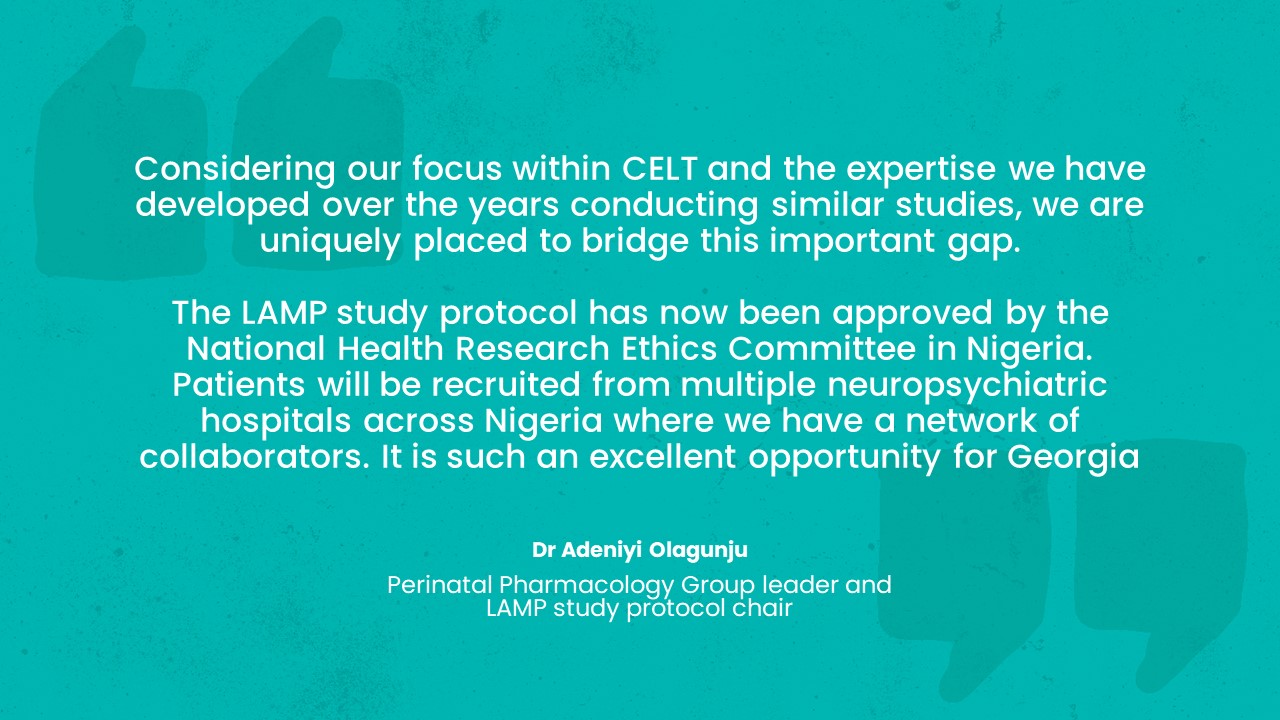
I’m Georgia Duffy, a PhD student in the Perinatal Pharmacology Group within the Centre of Excellence for Long-acting Therapeutics (CELT). I am being supervised by Dr Adeniyi Olagunju and my project is focused is Long-acting Antipsychotics for Mental Ill-health in Pregnancy and Postpartum (LAMP). My project is part of the LAMP study which is a multi-centre cohort study. Its overarching aim is to advance our understanding of the pharmacology of long-acting injectable antipsychotics (LAIA) during pregnancy and lactation.
The mental-ill health burden in pregnancy and postpartum

Mental ill health has become a hot topic of discussion, as the societal focus shifts from physical to emphasizing the importance of mental health. The epoch in which women experience pregnancy, childbirth and postpartum correlates with an elevated onset of many psychiatric disorders, including bipolar disorder and schizophrenia. While the perinatal period (defined as anytime within pregnancy to a year after birth) is normally is a time of joy, excitement, and anticipation for many new and expectant mothers. Many women have to battle balancing pregnancy alongside new or pre-existing mental health conditions.
In 2014, the economic burden of perinatal mental ill health in the UK was estimated at £8.1 billion per annum. In high income countries, 1 in 10 women battle mental health problems during this time, while the numbers increase to 3 in 10 in low- or middle-income countries.
Unipolar and bipolar depression pose their own challenges, with more than 30% and 52% respectively experiencing psychiatric decompensation during pregnancy. Additionally, 9.6% of women are diagnosed with postnatal anxiety disorders during the postpartum period, adding another layer of complexity to an already delicate time.
Long-acting injectable antipsychotics
LAIAs have shown great promise in treating mental ill-health in non-pregnant individuals. LAIAs are innovative treatments which provide a slow and sustained release of a drug over a period of weeks or months as opposed to regular oral dosages which requires taking frequent tablets to sustain therapeutic effect. This LAIAs can relieve the high burden of taking frequent oral tablets and results in higher adherence and completion rates of therapy.
Further benefits of LAI antipsychotics over their oral counterparts have been well-documented in studies conducted in the general population. A recent self-controlled case series study in Hong Kong, involving approximately 70,000 people with schizophrenia, revealed that LAIAs were associated with a lower risk of disease relapse and hospitalisation compared to oral antipsychotics, with incidence rate ratios ranging from 0.52 to 0.63. What's more, the study found that LAIAs did not increase the risk of adverse events, making them a promising option for managing mental health during the perinatal period.
LAIAs are now considered the optimal treatment option for any patient where maintenance antipsychotic treatment is indicated but unfortunately LAIAs are not licensed for use in pregnant and breastfeeding women due to uncertainties about their safety.
Up to 90% of women reported taking at least one drug during pregnancy. Pregnancy causes physiological changes that often affect how the body handles drugs. Additionally, the unborn child and breastfed babies are exposed to medications taken by their mother. There is a general lack of adequate information in these areas to guide evidence-based recommendations. The situation is worse for LAIAs and the impact of physiological changes on how the body processes them during pregnancy, as well as the extent of in utero fetal exposure and breastfed infant exposure through breastmilk are poorly understood.
LAMP study objectives
The LAMP study aims to unlock the potential of LAIAs by deepening our understanding of the clinical pharmacology of LAIA during the perinatal period. We will recruit pregnant women across multiple mental health clinics and follow them up until 6 weeks postpartum. We will use the dried matrix spot technology to collect blood and breastmilk samples to quantify drug levels to describe the concentration-time profiles of selected LAIAs during pregnancy and postpartum, as well as new-born and breastfed infant drug concentration. Clinical data on maternal response and side effects will also be collected. LAMP study will initially recruit participants in Nigeria.
This study will deliver unique insights into the pharmacology of these agents, highlight potential opportunities to optimise therapy, and generate data for evidence-based recommendations. The findings are expected to provide invaluable insights for healthcare providers regarding the use of these drugs, enabling them to make informed, evidence-based decisions on their administration to pregnant or breastfeeding women.

Find out more about the Perinatal Pharmacology Group at CELT